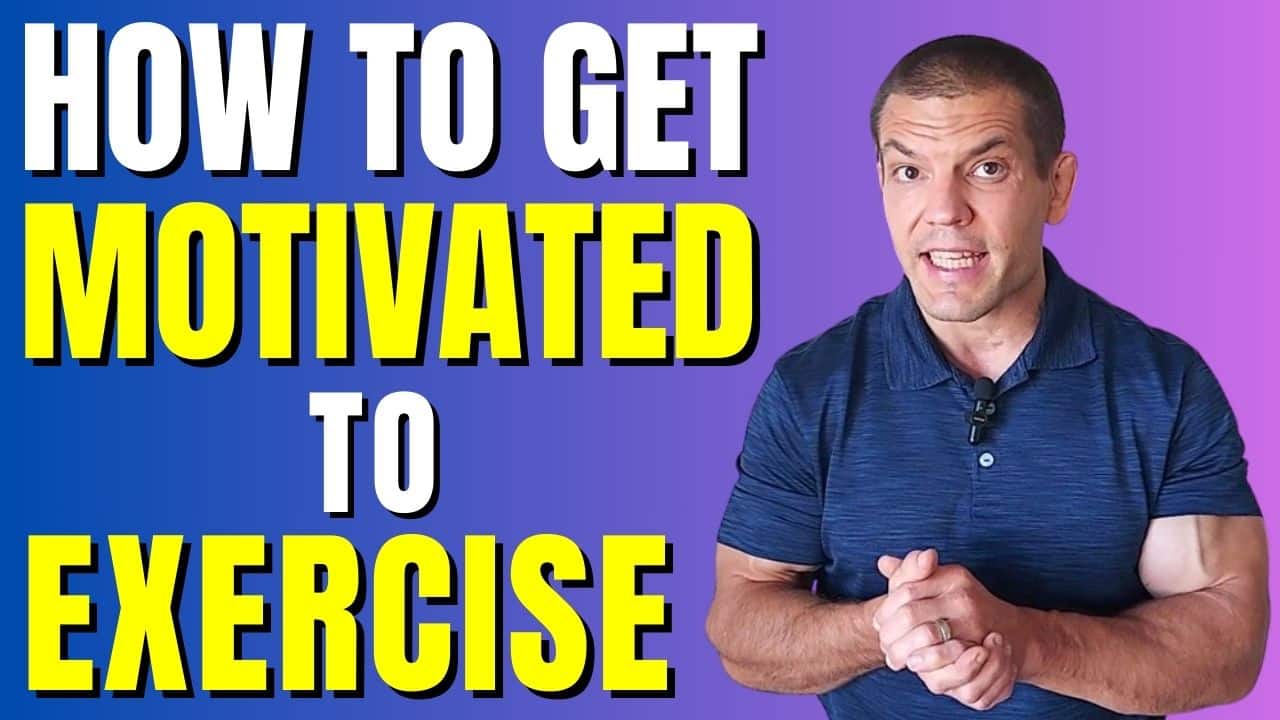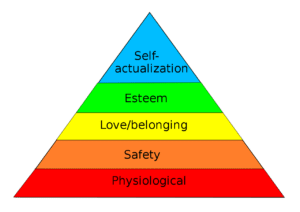The number one reason why exercise programs fail is lack of consistency.
But how do you motivate yourself to exercise consistently if you're feeling tired or if you just don't enjoy exercising?
Watch this video to learn how to get motivated to exercise and actually enjoy doing it.
Table of Contents
- Understanding Your Why
- Overcoming Barriers
- Tapping Into Deep-Seated Beliefs
- Using Rewards to Form Habits
- Starting Small
- Summary
Understanding Why You Want To Get Motivated To Exercise
There are thousands of videos and articles on the internet about how to get motivated to exercise, but most of them are just on the surface level. I'll take a deep dive into the real reasons why you have trouble staying motivated to exercise. Plus I'll share how to get motivated to exercise consistently and how to like and actually enjoy doing it.
To really understand why you have trouble getting motivated to exercise, you first need to know your why.
Why do you want to exercise in the first place?
Now, this isn't necessarily a new tip, but again, most people just brush the surface level such as, "I want to lose 20 pounds," "I want to fit into my old clothing," "I want to be healthier." But those are just surface level.
To really get deeper down into it, you need to understand:
"What's the unmet need that exercise is fulfilling?"
And to understand that, you need to understand Maslow's hierarchy of needs.
Maslow's Hierarchy of needs is essentially a pyramid.
At the very base level, you have your physiological needs. What do you need to survive?
For example if you don't exercise at all, you might eventually get diabetes or heart disease and die.
Above that, there's safety needs.
A reason to exercise might be that you want to be safe in your home. You don't want to fall, and by exercising regularly, you can make yourself stronger so that you avoid falling.
Above that, there's the need to feel loved and belonging.
For example, if you're stronger and more active, you can do things with your family and friends. Beyond that, you may just want to look more attractive and pleasing to your spouse or partner.
Next, there's self-esteem.
This would include feeling proud after exercising or feeling proud of yourself for losing 20 pounds.
Then at the very top of the pyramid, there's self-actualization and self-mastery.
This is where you're really going to form a long-term habit that helps keep you exercising for the long term.
You don't just exercise because you're motivated to do it but you fall in love with the habit.
In this stage, you're on a journey to become your best self.
Even on the days that you don't feel motivated to exercise, you can get yourself to do it because you're the master of your own self.
As someone who's exercised consistently five days a week or more for at least 28 years, I can tell you that there are many, many, many days that I don't feel motivated to exercise.
But I do it because I love the habit of exercise.
The process isn't always that fun.
I don't really enjoy exercising, but I enjoy the things that come from it, and I enjoy the self-discipline of knowing that I can get myself to do it every day, even on the days that I don't really feel like it.
Overcoming Barriers To Exercise
Now the next step is understanding your barriers.
What are the things that stop you from exercising?
These fall on conscious, subconscious, and unconscious levels.
A conscious barrier might be, "Well, I'd rather watch TV," or "I'd rather go to the movies," or "I'd rather go to the bar with my friends."
A level below that, there may be subconscious beliefs such as, "Exercise is too hard," or, "I'm too old to start exercising."
And then deep down below that, there are probably some unconscious, deep-seated beliefs that have been with you for most of your life.
These are typically formed when you're really young, either from environments that you grew up in or things that you observed.
They've kind of stuck with you as guiding principles throughout your life, even though you were really probably unaware of them.
These may be things like, "Everyone in my family has been overweight, I have no chance of losing weight, I'm not going to even try."
Or things like, "I'm not a good athlete, I was always picked last for the team when I was in school, exercise isn't for me."
Those are unconscious beliefs that you've probably had for a long, long time, and it's really tapping into those unconscious beliefs and reversing them.
The Superego, Ego, and Id
Your unconscious beliefs, according to Freud, are based on what's called the superego, the ego, and the id.
The id is your deep down primal desires, the desire to seek out things that are pleasurable and to avoid pain.
Now exercise can be painful. It's much easier to sit on the couch and relax.
In fact, it's evolutionarily beneficial to conserve energy.
Back when we were hunters and gatherers and didn't know where our next meal was coming from, it was beneficial to NOT do things that we didn't need to that burned energy.
But today, we sit most of the day, and we don't move around as much as we need to.
But that primal desire to relax and avoid doing things that are painful that burn energy is still there.
Now the ego mediates the desires of the id with the realities of the world. For example, you may think, "I would really rather sit on the couch and eat bonbons, but I know that in order to be healthy, I need to exercise."
Finally, the superego is internalized societal values. We've learned through society that it's generally viewed as good and admirable to exercise.
This is the reason why you may feel guilty for not exercising or proud when you have exercised.
We generally think that being fit and healthy is a desirable trait, and that being unfit or unhealthy or overweight are undesirable traits.
Tapping Into Deep-Seated Beliefs
So how do you tap into some of those deep-seated subconscious and unconscious beliefs and reverse them so that you can actually be successful with an exercise program?
This is very important, and if you don't do it, it's very likely that you may not have long-term success with exercise.
So it may be a little bit challenging. It may even feel a little uncomfortable at times.
However, one way to reverse a deep-seated belief is by using reframing.
To give an example, "Exercise is too hard."
You might reframe that thought whenever you think it to think, "Exercise is hard, but I'll be stronger because of it."
Another example might be, "My whole family has been overweight. There's no hope for me to lose weight."
And I've got some bad news for you:
If that were true, then your children are destined to be unhealthy and overweight. Your grandchildren are destined to be unhealthy and overweight. Your great-grandchildren and great-great-grandchildren, and many generations beyond that are also destined to be unhealthy and overweight.
But you can reframe that thought as, "Even though everyone in my family has been overweight, I can choose to engage in healthy behaviors and become healthier and lose weight."
Furthermore, you can stop that dysfunctional belief from being passed down to your children and grandchildren in future generations.
So if you can't motivate yourself to exercise for yourself, do it to stop that dysfunctional belief from being passed down to future generations.
Using Rewards to Form Habits
Another cognitive-behavioral technique you can use to form a consistent habit of exercising is to reward yourself.
Again, we seek out pleasure and seek to avoid pain.
So if you follow up that "pain" of exercising with something pleasurable, it helps condition you to actually want to exercise.
It's kind of like the classical experiment of the Skinner box where they put a rat in a box and trained it that whenever it pressed a lever, it would get a food pellet.
Now in this example, you're the rat.
You train yourself to do something such as exercise in order to get a reward.
Now that reward shouldn't be something like ice cream or candy that's going to sabotage your health goals.
However, treating yourself to a healthy snack or something like a relaxing bath after you exercise are both good examples of ways to reward yourself for exercise.
This way you train your brain to want to engage in the habit of exercising
Starting Small
But how do you get started with an exercise program?
New habits are hard to form, especially if you've had a long history of doing the opposite of the habit.
In order to form the habit of exercising, you want to try to start small.
I didn't come up with these concepts.
There are great books like Tiny Habits by BJ Fogg or Atomic Habits by James Clear.
Tiny Habits: The Small Changes That Chan...
(as of February 23, 2026 09:17 GMT -06:00 - More infoProduct prices and availability are accurate as of the date/time indicated and are subject to change. Any price and availability information displayed on [relevant Amazon Site(s), as applicable] at the time of purchase will apply to the purchase of this product.)Auto Amazon Links: No products found. (1 items filtered out)
Essentially, you want to set yourself up for success by starting with extremely small goals.
Examples include:
- Exercising two minutes a day
- Doing one or two push-ups a day
- Walking for five minutes
Make your goals extremely small and attainable at first.
It is not going to benefit your health a lot at first.
You will not get significantly healthier by doing one push-up a day or walking five minutes a day.
But what you WILL do is form the habit of exercising.
If you can walk for five minutes a day, then you can probably walk for six minutes a day.
If you can walk for six minutes a day, you can probably walk for seven minutes.
...and so on.
As you gradually build upon that habit, eventually it becomes something that's actually beneficial for your health.
But it's more important to form the habit first and then build upon that habit after the habit is ingrained.
You can also pair that habit with some other behavior that you do regularly.
For example, balancing on one leg while you're brushing your teeth or taking a walk after dinner.
If you pair your new habit with a pre-existing habit, you're more likely to be successful.
Summary
To summarize, how do you motivate yourself to exercise consistently?
You don't.
Motivation will get you started, but it'll also get you stuck.
It's the habit of exercise that will carry you through the long term.
You don't have to fall in love with the process of exercising, but fall in love with the results.
Fall in love with the habit and the self-discipline and the self-mastery, and that's how you'll set yourself up for long-term success.
Need Help To Get Motivated To Exercise?
Tap the button below to request an appointment with one of our specialists.




